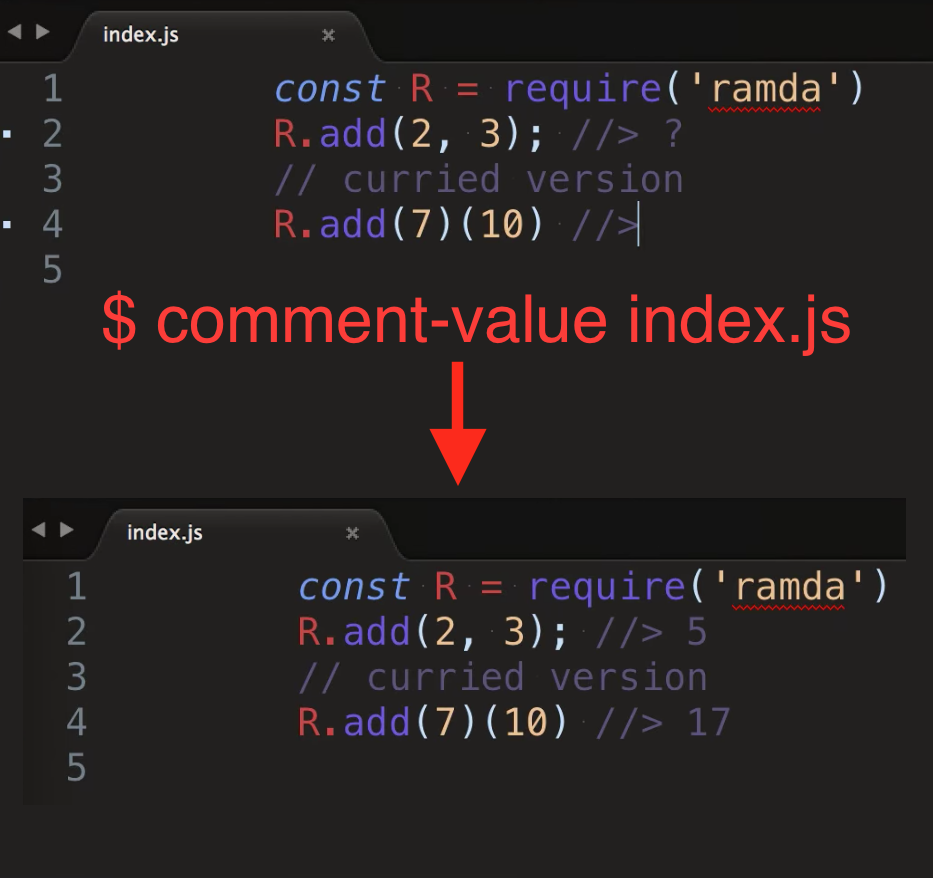comment-value
Instruments a Node program and updates its comments with computed expression values
Why?
Writing and maintaining code examples is hard. Often the values shown in the comments (think blog posts) are out of date and incorrect.
Read more about the problem and this tool solves it in blog post Accurate values in comments.
What does comment-value do?
comment-value (or available aliases values, comment, comments)
executes your Node program, instrumenting it on the fly.
Every time it sees a special comment that starts with //>,
it will set it value from whatever the expression immediately to its left is.
When Node finishes, the file is saved back with updated comments.
Click on the above screen shot to see 15 second demo clip.
Watch mode
Automatically (well, as long as chokidar works) reruns and updates comments
in the source file. See the
video,
it is awesome!
Install and use
Install comment-value either as a global or as a local package.
npm install -g comment-value
Use either using node -r comment-value index.js or via CLI alias:
comment-value, values or cv like this values index.js.
Alias values is the preferred way. It allows
- Watch files for changes and rerun with
-w, --watchoption - Print instrumented file with
-i, --instrumentedoption
Example
Add a few comments that start with //> to index.js. You can put anything
after that into the comment.
// index.jsconst add = a + b //> //> ? anything here// you can also print variablesconst t = typeof add// t:// or variable types directly// add::Run the comment-value script which runs your Node
$ comment-value index.jsThe index.js will now contain
// index.jsconst add = a + b //> 5 //> -1// you can also print variables!const t = typeof add// t: "function"// add:: "function"Comment format
You can start special value comments to be updated with strings
//>, //=>, //~>, // >, // => and even // ~>.
For variables, use line comment with just variable name followed by :,
for example
{ // a: // b:}which will produce
{ // a: 10 // b: 2}To print the type of a variable, use variable name followed by ::, for
example
{ // a:: "number" // b:: "string"}Composed functions
You can even get results from composed functions, for example, the values below were all computed automatically
var R = R-4 //=> 7Mixing values and types
You can record either values or types of values
var R = R-4// :: numberConsole log statements
If the value comment is on the left of console.log(value) expression,
then it will be updated with the value.
// index.jsconsole //> ?$ comment-value index.js42// index.jsconsole //> 42Debug
To see verbose messages while this module runs, set the environment
variable DEBUG before running
DEBUG=comment-value node ...
The instrumenting function has a global emitter, you can receive messages when special comments are found and when an expression is wrapped. For example this code will produce the following events
// index.jsconsole //> ??// spec.jslet emitterThis is an internal feature and is used during unit tests.
Small print
Author: Gleb Bahmutov <gleb.bahmutov@gmail.com> © 2017
License: MIT - do anything with the code, but don't blame me if it does not work.
Support: if you find any problems with this module, email / tweet / open issue on Github
MIT License
Copyright (c) 2017 Gleb Bahmutov <gleb.bahmutov@gmail.com>
Permission is hereby granted, free of charge, to any person obtaining a copy of this software and associated documentation files (the "Software"), to deal in the Software without restriction, including without limitation the rights to use, copy, modify, merge, publish, distribute, sublicense, and/or sell copies of the Software, and to permit persons to whom the Software is furnished to do so, subject to the following conditions:
The above copyright notice and this permission notice shall be included in all copies or substantial portions of the Software.
THE SOFTWARE IS PROVIDED "AS IS", WITHOUT WARRANTY OF ANY KIND, EXPRESS OR IMPLIED, INCLUDING BUT NOT LIMITED TO THE WARRANTIES OF MERCHANTABILITY, FITNESS FOR A PARTICULAR PURPOSE AND NONINFRINGEMENT. IN NO EVENT SHALL THE AUTHORS OR COPYRIGHT HOLDERS BE LIABLE FOR ANY CLAIM, DAMAGES OR OTHER LIABILITY, WHETHER IN AN ACTION OF CONTRACT, TORT OR OTHERWISE, ARISING FROM, OUT OF OR IN CONNECTION WITH THE SOFTWARE OR THE USE OR OTHER DEALINGS IN THE SOFTWARE.


